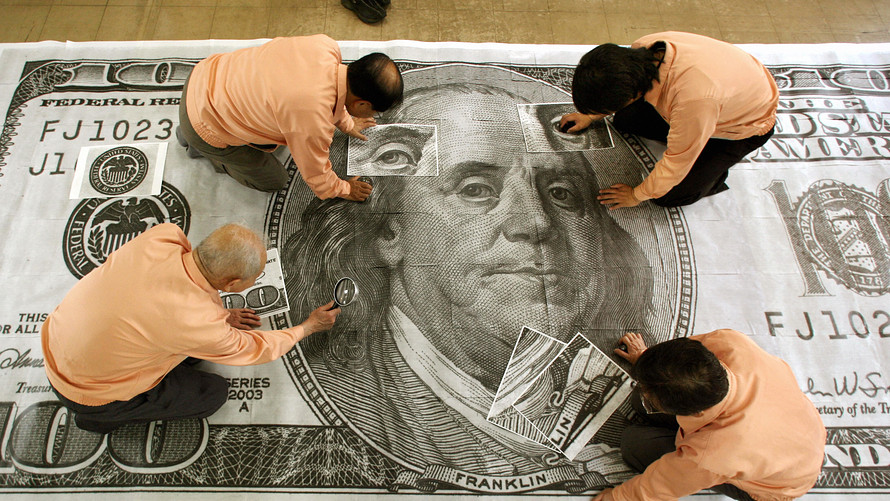
Yuan loses ground after U.S. stops short of calling China a currency manipulator
The U.S. dollar strengthened as Thursday’s session went on, leading to a softening of risk-sensitive currencies.
As the buck pulled higher, global equities, including U.S. benchmarks such as the S&P 500 SPX, -1.44% and the Dow Jones Industrial Average DJIA, -1.27% pushed lower. Meanwhile, Treasury Secretary Steven Mnuchin said he wouldn’t attend the upcoming investment conference in Saudi Arabia, which coincided with a brief spike for the buck.
Mnuchin’s decision followed Secretary of State Mike Pompeo saying the Saudi government should be given more time to investigate the disappearance of journalist Jamal Khashoggi, whose suspected murder in the Saudi consulate in Istanbul has led to a number of business leaders and news organizations, as well as IMF chief Christine Lagarde, pulling out of the conference.
The ICE U.S. Dollar Index DXY, -0.01% was last up 0.4% at 95.920, while risk-sensitive currencies such as the Canadian dollar USDCAD, -0.2904% and Australian dollar AUDUSD, +0.1549% softened. The popular gauge for the greenback is on course for a 0.7% gain this week, its best performance since late September.
Emerging-markets currencies also deepened their losses against the buck, with the largest moves in the Mexican peso USDMXN, -0.1504% , South African rand USDZAR, -0.4477% and Turkish lira USDTRY, -0.1737% , against which the dollar rallied 1.5%, 1.6% and 1.2%, respectively.
The peso also suffered after earlier comments from President Donald Trump, who, in a tweet, threatened to close the U.S. border to Mexico over immigration issues.
Elsewhere, the Treasury refrained from labeling China a currency manipulator in its biannual report on foreign exchange practices released late Wednesday, saying intervention by the People’s Bank of China has been limited this year. But it did issue a stern warning about yuan weakness, which has declined by around 7% versus the dollar in 2018.
Analysts have largely attributed the yuan-dollar weakness to market forces, including the emerging-market selloff over the summer, as opposed to willful devaluation as a tactic in the U.S.-China trade war. A weaker currency makes a country’s goods more competitive on the global market.
The yuan weakened following the Treasury report. In Beijing, the Chinese currency briefly touched its lowest level since January 2017. One buck last fetched 6.9378 yuan USDCNY, -0.1095% , up 0.2%. In the offshore market, the yuan was at its lowest level since August on Thursday, with one dollar buying 6.9442 yuan USDCNH, -0.0778% up 0.2%.
The currency weakness also came as Chinese stocks hit four-year lows to lead Asian equities to the downside. The Shanghai Composite SHCOMP, +2.58% dropped nearly 3%, while the Shenzhen Composite 399106, +2.58% lost 2.7% in Thursday’s session.
In other China news, the country’s gross domestic product data for the third quarter — expected at 6.6% on the year, its lowest since 2009 — is due at 10 p.m. Eastern.
In Brussels, the latest European Union summit on the topic of Brexit kicked off Wednesday, with the possible extension of the post-Brexit transition period to three years seemingly at the center of talks. This extension would give the U.K. an additional year to agree to a trade deal with the EU and is considered an olive branch in the negotiations.
The euro EURUSD, -0.0087% was slightly weaker at $1.1462, down from $1.1502 late Wednesday, while the British pound GBPUSD, +0.1690% bounced around between positive and negative territory, last trading at $1.3025, down from $1.3114.
In other European news, the Italian budget proposal was the source of negative headlines. The proposal, which projects Italy’s budget deficit to widen, was expected to be met with resistance in Brussels as it is in relation to European Union budget guidelines.
European Central Bank President Mario Draghi said countries questioning the European Union’s budget rules could damage growth and financial conditions in a summit on eurozone integration, according to Reuters. Draghi, however, did not name Italy directly in his remarks.


